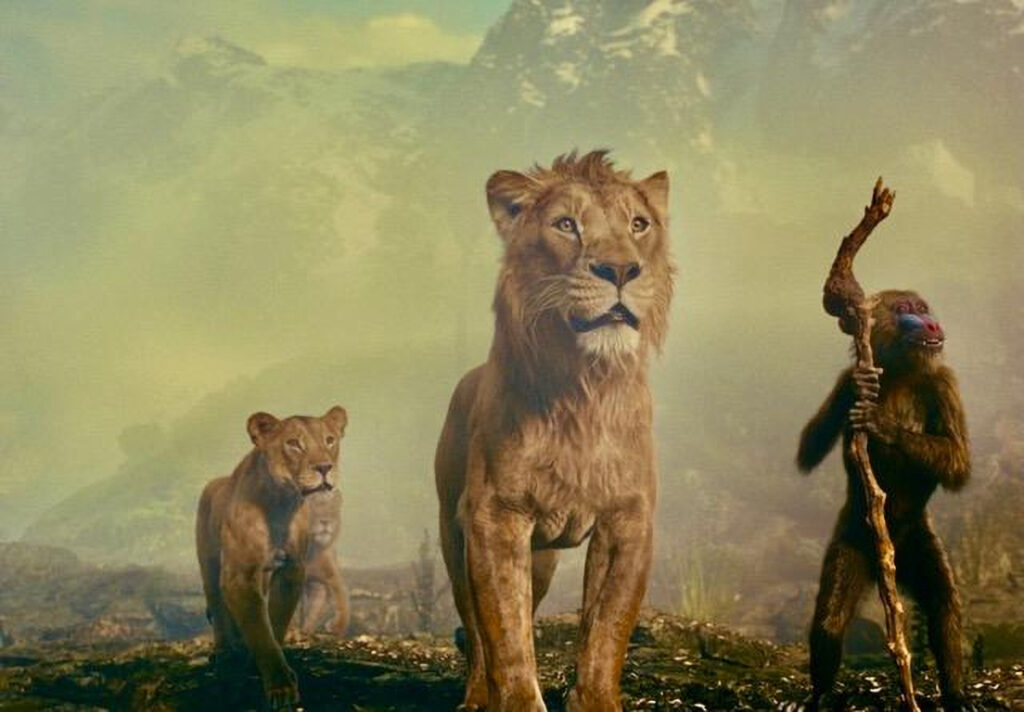By Dwight Brown
NNPA Film Critic
(***) “Every being has a place in the circle of life,” and “No more kings, we are all one.” Those lines of dialogue sum up the two major themes of this entertaining prequel/sequel. It’s the successor to 2019’s photorealistic/animated The Lion King ($1.6B international box office), which was the live-action version of the 1994 traditionally animated The Lion King ($981M).
Anyone guessing what this chapter’s box office receipts will be, needs to consider the heavy competition during the holiday season. Sonic the Hedgehog 3, Wicked and Moana 2 are soaking up all the oxygen in the room. That said, Mufasa: The Lion King will definitely charm families and sell a lot of tickets. That’s due to its captivating, life-like photoreal computer-generated imagery and a narrative that’s compelling for its entirety (1h 58m).
Director Barry Jenkins (Moonlight) and screenwriter Jeff Nathanson (2019’s The Lion King) have created a storyline that champions all the values good parents would want to bestow on their children: Finding ways to survive and thrive in the darkest moments, cherishing friendships and family no matter who they may be and standing up to bullies. All are good messages, in times like these. Values that need constant reinforcement.

(Image via NNPA)
Rafiki (John Kani), an older griot-like mandrill, schools the lion cub Kiara (Blue Ivy Carter) on her ancestors and heritage. His recollections are witnessed by a fidgety audience of two: Pumbaa (Seth Rogan) the warthog and Timon (Billy Eichner) the meerkat. Rafiki: “It’s time. I will tell you a story…”
Mufasa (Braelyn Rankins), a small lion cub, is separated from his parents during a natural disaster. He washes up on a riverbank and is saved by another cub, Taka (Theo Somolu). His rescuer, a prince, brings him back to his pride. Esche (Thandie Newton), Taka’s mom, wants to nurture the orphan. Obasi (Lennie James), his dad the king, thinks the interloper should be eaten or banished. Of course, mom wins out.
Years go by, and the older Mufasa (Aaron Pierre, Rebel Ridge) has been relegated to hunting with Esche and the females as a punishment. Paradoxically, the hunting expeditions have become a training ground for the young warrior lion who learns to trust his instincts. Meanwhile Taka (Calvin Harrison, Chevalier) has been pampered and sheltered. Like his dad, who sleeps all day. When Obassi’s pride is threatened, Mufasa and Taka are told to escape. Along their path the two meet and befriend Rafiki (Kagiso Lediga) a young mandrill, Sarabi (Tiffany Boone) a lioness and Zazu (Preston Nyman) a hornbill bird who’s Sarabi’s flighty majordomo. This new extended family seeks a promised land named Milele, which is their destiny. They’re followed by an evil group of animals bent on their annihilation.
The story-within-a-story format gets a bit confusing. Some viewers may wonder why this allegory didn’t just spin Mufasa’s yarn directly, without constant interruptions as Rafiki tells his tale. That’s a justifiable concern. However, the rest of the narrative plays out like a gem of an action/adventure/animation/family film. Kids are fed lofty notions about perseverance and helping others, that’s the subtext. But they’ll likely get caught up in the non-stop action and dazzling landscapes, from taupe plains to snowy white mountains. Watching the lions and animals run, especially when provoked by disasters or enemies is quite exhilarating. The rivalries and love triangles mix in drama and romance. There is no boring moment. No let down. Lots of kinetic energy.
This genre requires strong visuals and audio effects, and they’re on view and heard. Visual effects supervisors Adam Valdez and Audrey Ferrara, visual effects producer Barry St. John and animation supervisor Daniel Fotheringham make the beasts and their movement vivid and thrilling. Production designer Mark Friedberg’s sense of design and color makes the landscapes evocative. Every moment and its essence are recorded by cinematographer James Laxton, while film editor Joi McMillon intuitively knows when to cut a scene. It’s likely the footage will be as much fun to watch on streaming services and TV, too.
Crashing sounds, swirling waters and big cat roars sound just right and accentuate the commotion, courtesy of supervising sound editor and re-recording mixer Onnalee Blank. Melodies flow courtesy of Dave Metzger’s enchanting musical score. Lin-Manuel Miranda’s (Hamilton) catchy tunes, which further develop the plot or characters, are memorable. Like the popish “I Always Wanted a Brother” or somber “Brother Betrayed,” which expand on the lion brothers’ feelings. While “We Go Together” sums up the film’s thesis on how disparate groups should coalesce for common goals: “If you want to go fast, go alone. If you want to go far, go together.”
The cast conveys philosophies and deep emotions with just their voices. Interchanges between Pierre and Harrison, from hopelessly bromantic to bitter and conniving, are convincing because the two actors have chemistry. Rogan and Eichner’s hilarious asides, improvised jokes and rapid-fire jibes will make kids giggle and adults howl with laughter. As Boon and Newton bestow their certain grace on the lionesses those characters become beguiling. And when you need a villain, call Mads Mikkelsen, TV’s Hannibal. He plays Kiros, the evil lion, like he knows how to make audiences loathe an antagonist.
Jenkins directs all on view well, with a great attention to detail. His passion for storytelling, instincts for guiding performances and ability to corral tech aspects are solid. Even young audiences viewing this The Lion King saga, without knowing its evolution, will still have fun following the storyline, attaching themselves to the likable characters and ogling the action/adventure aspects.
Thirty years after the original The Lion King, who could imagine that themes like “Every being has a place in the circle of life” and “No more kings, we are all one” would still be so relevant. They are. They’re more fitting than ever.
Visit Film Critic Dwight Brown at DwightBrownInk.com.




